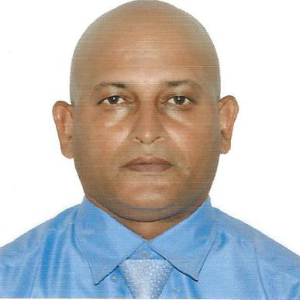Title : Nanotechnology and its pursuit, in the treatment of COVID-19
Abstract:
COVID-19 is caused by the SARS-COV-2 virus and became a pandemic on the 3rd of March, 2020. Since then it has cause havoc on humanity lives, affecting all aspects. Initial treatments include chloroquinine and Remdesivir, amongst other drugs. The latter was discontinued by FDA. Since then, humanity has seen the emergence of several vaccines: Oxford AstraZeneca, Moderna, Sputnik-V, Sinopharm and Pfizer, amongst others. Virologists, biologists, pharmacists, materials scientists, and clinicians are collaborating to develop further efficient treatment strategies. The best vaccine is yet to emerge. In addition to these, nanotechnology in nanomedicine offers promises in the treatment of COVID-19. Nanomedicine has already proven its value through its application in drug delivery and nanosensors in other diseases. Nanomedicine and its components can play an important role in various stages of prevention, diagnosis, treatment, vaccination, and research related to COVID-19. Nano-based antimicrobial technology can be integrated into personal equipment for the greater safety of healthcare workers and people. Nanomaterials such as quantum dots can be used as biosensors to diagnose COVID-19. Nanotechnology offers benefits from the use of nanosystems, such as liposomes, polymeric and lipid nanoparticles, metallic nanoparticles, and micelles, for drug encapsulation, and facilitates the improvement of pharmacological drug properties. Nanomaterials can aid in the drug/vaccine delivery process. Antiviral functions for nanoparticles can target the binding, entry, replication, and budding of SARS-COV-2 i.e various stages of the virus life cycle. The toxicity-related inorganic nanoparticles are one of the limiting factors of its use that should be further investigated and modified. Nanomaterials have already shown its uses in the treatment of pneumonia. This presentation will discuss the emerging role of nanotechnology in the development of therapeutic agents to totally eradicate the SARS-COV-2 virus. Of course, FDA and WHO approval will be necessary to see its use on humanity.
Audience take-away:
- Most of the audience are nanotechnologists and thus can incorporate part of my research in their work or apply them to their work.
- The audience will be more knowledgeable at work in nanotechnology, with specific focus on COVID-19. Thus research faculty can use part of my research to expand their research. However, they must reference my work. It will improve the accuracy of a design, or provide new information to assist in a design problem.



